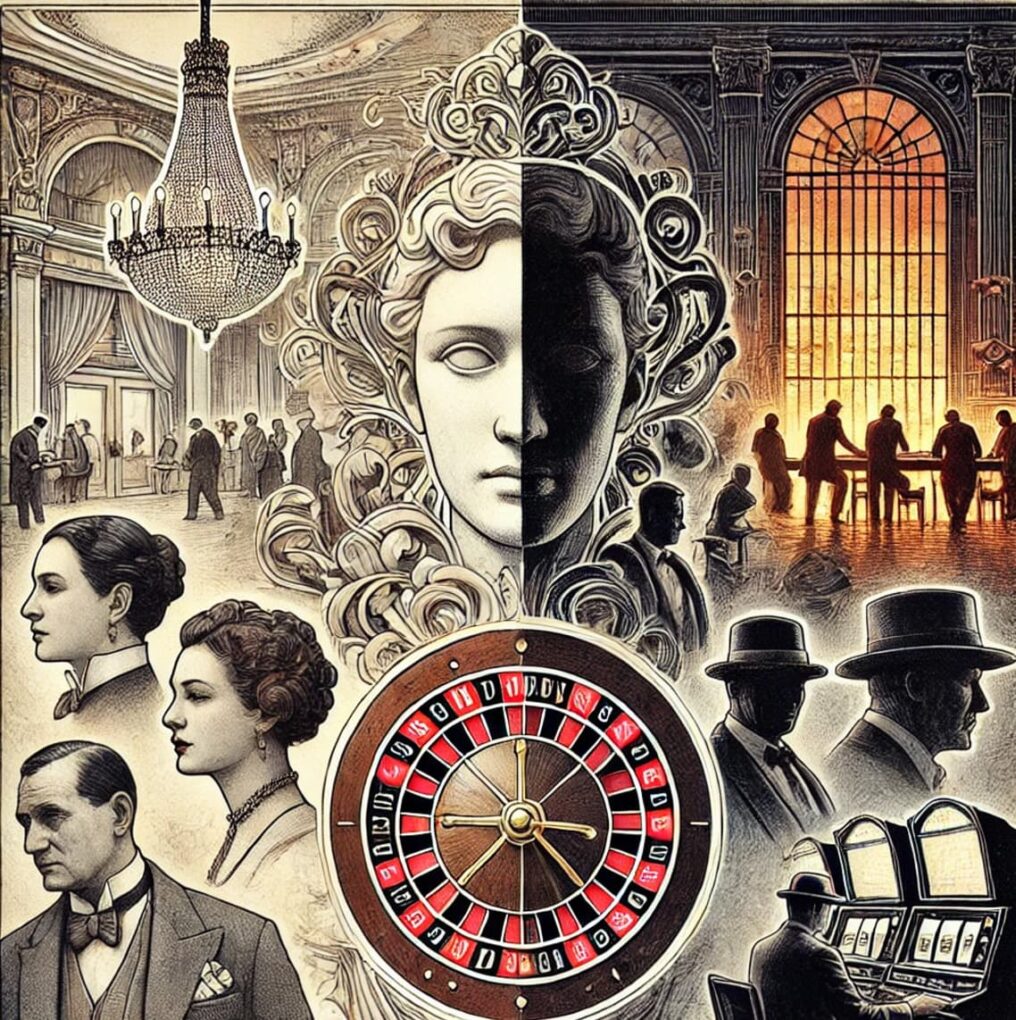Casinos have long epitomised the duality of human nature — an allure of quick riches paired with the destructive power of gambling. Literature frequently employs this theme to delve into human emotions, social structures, and moral dilemmas. Stefan Zweig’s “Twenty-Four Hours in the Life of a Woman” and David Hill’s “The Vapors: A Southern Family, the New York Mob, and the Rise and Fall of Hot Springs, America’s Forgotten Capital of Vice” may differ in era and style but share a common purpose: exploring the depths of human behaviour through the lens of gambling.
Modern Casinos: A Changed Perspective
Today’s casinos bear little resemblance to the dens of vice and passion they were perceived as in previous centuries. Advanced technology, government regulations, and evolving societal attitudes have softened their once-seedy reputation.
Online casinos, in particular, are reshaping this perception. Far from being predators draining life and money, they now position themselves as centres of adult entertainment. Modern platforms such as Lord Ping, regulated by the UK Gambling Commission, ensure player safety by enforcing strict measures like banning credit card use to prevent financial harm. This evolution prompts a compelling comparison between the literary portrayals of casinos from the 19th and 20th centuries and their contemporary counterparts.
Casinos in Zweig’s World: A Theatre of Human Drama
Stefan Zweig, a master of psychological storytelling, portrays casinos as stages for intense human emotions in his novella “Twenty-Four Hours in the Life of a Woman.” The narrative follows an elderly Englishwoman who recounts her encounter with a young gambler spiralling into despair after a ruinous loss. This chance meeting prompts her reflections on the psychological grip of gambling.
For Zweig, casinos are more than mere settings — they are symbols of human vulnerability. The young gambler, consumed by his obsession with roulette, seeks not wealth but escape from reality. His losses signify not just monetary defeat but a surrender of self-control.
Zweig’s depiction is both elegant and tragic. The tension of the roulette wheel, the figure of the croupier, and the spinning ball serve as catalysts for emotional explosions. The casino itself, with its glittering chandeliers, is a paradoxical space where external splendour masks the internal turmoil of its patrons.
Hill’s Casinos: Engines of Power and Manipulation

David Hill’s “The Vapors” offers a contrasting perspective, delving into the darker socio-political role of casinos. Set in mid-20th century Hot Springs, Arkansas — dubbed “America’s Las Vegas” — the book explores the intersection of gambling, corruption, and organised crime.
Hill’s portrayal centres on casinos as tools of power, fostering illusions of wealth while serving the interests of criminal elites. Beneath their glamorous exteriors lies a web of illegal activities: money laundering, racketeering, and societal manipulation. Unlike Zweig’s romanticised image, Hill reveals a stark reality where gambling becomes a means of societal control.
Contrasting the Two Perspectives: The Dual Faces of Casinos
1. Era and Cultural Context
- Zweig’s early 20th-century casinos reflect European ideals of luxury and aristocratic indulgence, encapsulating human passions and dramas.
- Hill’s mid-20th-century American casinos highlight the harsh realities of corruption and inequality, emblematic of a society grappling with organised crime.
2. Character Motivations
- Zweig’s narrative focuses on personal emotions and conflicts, with characters driven by compassion, despair, and the pursuit of salvation or self-destruction.
- Hill presents characters often as pawns in systemic structures, their gambling shaped not by individual desires but by external pressures and manipulations.
3. The Role of Casinos
- For Zweig, the casino is a metaphor for internal struggles, a battleground for human weaknesses and aspirations.
- For Hill, the casino is a tool of societal control, where emotions are subjugated to external forces.
Realism in Casino Portrayals
Both works are realistic in their own ways, though they emphasise different facets of the gambling world. Zweig creates an emotionally charged portrait of casinos, seen through the lens of human psychology. Hill focuses on the socio-economic mechanisms underpinning their operations, uncovering the realities behind the glamour.
In reality, casinos often embody elements of both portrayals. They can be stages for personal dramas, where lives change overnight, as well as part of broader systems of economic and social influence, especially in major gaming hubs like Las Vegas or Macau.
The Literary Symbolism of Casinos
In literature, casinos are potent metaphors for human desires and weaknesses. Zweig uses them to symbolise irrationality, where the pursuit of wealth eclipses reason. Hill employs them as instruments of power, exploiting the desire for riches to maintain control.
Ultimately, both authors reveal that casinos are more than mere entertainment venues. They are spaces where human destinies, ambitions, and vulnerabilities collide. Whether in Zweig’s romantic drama or Hill’s documentary-style narrative, literature helps us understand the complex realities behind the glitz and noise of the gambling world.

Comments are closed, but trackbacks and pingbacks are open.